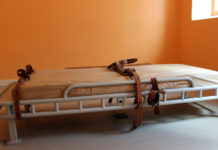Inhumane Medicine in Germany: A Dark Chapter Continued
Although I left Ueckermünde without the ability to speak, heavily traumatized and barely able to move, I managed to reclaim life after more than a decade. Today I am one of the few witnesses who survived the Hell of Ueckermünde, who can tell the story of my companions and raise awareness of the injustice committed against us as well as demand answers.
MIA Survey: Ex-patients Tell of Force, Trauma and Sexual Abuse in America’s Mental Hospitals
In a MIA survey of people who had been patients in mental hospitals, nearly 500 respondents told of an experience that was often traumatic, and frequently characterized by a violation of their legal rights, forced treatment with drugs, and physical or sexual abuse. Only 17% said they were “satisfied” with the “quality of the psychiatric treatment” they received.
Berlin Manifesto for Humane Psychiatry Released
Changing the mental health and psychosocial support system in Germany requires public debate about the ways our society should help and support people in mental crisis and with chronic mental health problems. We believe the driving force behind all help and support should be humanitarianism and respect for inalienable human rights.
Risk of Suicide After Hospitalization Even Higher Than Previously Estimated
New analysis of post-discharge suicide rates finds estimates 6 times higher than recent studies.
Abolishing Forced Treatment in Psychiatry is an Ethical Imperative
Forced treatment in psychiatry cannot be defended, neither on ethical, legal or scientific grounds. It has never been shown that forced treatment does more good than harm, and it is highly likely that the opposite is true. We need to abolish our laws about this, in accordance with the United Nations Convention on the Rights of Persons with Disabilities, which virtually all countries have ratified.
Forced Drugging with Antipsychotics is Against the Law: Decision in Norway
In all countries, we need to work for ensuring that forced medication for psychiatric patients is forbidden by law. Virtually all countries, apart from the US, have ratified the UN Convention on the Rights of Persons with Disabilities, which prohibits forced drugging, but not a single country has done anything.
“Prisons Without Bars” – Forced Institutionalization of People with Disabilities
In the wake of deinstitutionalization, we no longer have the vast asylum system we once did. Instead, something more insidious has taken root — for-profit institutions that call themselves neurorehabilitation centers, group homes, and other official-sounding names.
Testifying in Vermont: Forced Drugs
Vermont Governor Shumlin recently suggested a change to state law that would accelerate the process under which a person could be forced to take antipsychotic drugs against her will. The House Human Services Committee reviewed this proposal and I was asked to testify. What follows are my comments.
Study Finds Improved Functioning for ‘Schizophrenia’ Without Antipsychotics
Long-term treatment with antipsychotic drugs is currently considered the standard treatment for patients diagnosed with ‘schizophrenia.’ A new study challenges this practice, however. The...
Evolution or Revolution? Why Western Psychiatry Won’t Change by Incremental Steps
...but how realistic is it to expect that the biological skew of Western psychiatry can be sustainably changed one small step at a time?
United Nations Report Calls for Revolution in Mental Health Care
In a new report, the United Nations Special Rapporteur on the right to health, Dr. Dainius Pūras, calls for a move away from the biomedical model and “excessive use of psychotropic medicines.”
Equal Legal Capacity or ‘Supported Decision-Making’?
At a recent conference on legal capacity, I was struck by the failure of another invited expert to adhere to the paradigm of supported decision-making as articulated by the CRPD Committee. We still need to work to ensure that this paradigm is well understood and appreciated, despite the progress made in national reforms.
The Curious Case of over 50 Consecutive ECTs in Melbourne
Over the past few weeks I have been witness to, and increasingly involved in trying to stop one of the most extreme examples of psychiatric brutality I have encountered in my 40 years in this field. And I have encountered quite a few. I suggest you sit down before watching and reading. This is not your usual, run-of-the-mill psychiatric abuse story.
Madness in Civilisation: A Cultural History of Insanity
Until recently the history of psychiatry was a neglected backwater whose murky depths were explored largely by psychiatrist. The impression conveyed by books such as Tuke’s Chapters in the History of the Insane in the British Isles, Macalpine and Hunter's Three Hundred Years of Psychiatry: 1535 - 1860, Berrios and Freemen's 150 Years of British Psychiatry 1841 - 1991, or Fuller Torrey and Miller's The Invisible Plague, is one that sees psychiatry and modern systems of mental health care as the inevitable outcome of progress through scientific thought, a (white European male-led) narrative from darkness and ignorance to enlightenment and knowledge.
After the Black-Box: Majority of Children Starting SSRIs Still Receiving Too High of Dose
In 2004, the FDA added a black-box warning to SSRI antidepressants on the increased risk of suicide among children taking these drugs. A new study suggests that this warning has increased the proportion of children who begin an antidepressant on a low dose, but the majority are still receiving higher than recommended doses.
Appealing to our Elected Representatives
This is the final of four installments about the bizarre, ongoing conduct of psychiatrists at Upton House, an Eastern Health psychiatric facility in Melbourne, and the collusion with their conduct by all relevant agencies. This last installment will document the failure, so far, of the State and Federal Governments to intervene in even this most extreme and blatant example of abuse of power by psychiatry. If I, as a Professor of Clinical Psychology with 40 years clinical and research experience in this field, can be so easily dismissed/ignored by the relevant systems in Victoria, what chance do the average users of mental health services and their families have of being heard in this State?
Forced Psychiatry is Torture
I am a survivor of forced psychiatry, and I bring this perspective with me as a human rights lawyer. People with disabilities have a right to be as we are and not to have our bodies and minds made over to suit other people. We alone have the right to decide whether a medical treatment will support who we are or detract from who we are, and that is why free and informed consent is the essential requirement.
Ioannidis Questions Strength of Psychology and Neuroscience Literature
Last week, well-known Stanford scientist John Ioannidis and his colleague Denes Szucs released a new analysis online. They examined research published in eighteen prominent...
Violence Caused by Antidepressants: An Update after Munich
The media is now reporting details about the 18-year-old who shot and killed nine and wounded many others before killing himself on July 22 in Munich. My clinical and forensic experience leads to a distinction among people who murder under the influence of psychiatric drugs. Those who kill only one or two people, or close family members, often have little or no history of mental disturbance and violent tendencies. The drug itself seems like the sole cause of the violent outburst. On the other hand, most of those who commit mass violence while taking psychiatric drugs often have a long history of mental disturbance and sometimes violence. For these people, the mental health system seems to have provoked increasing violence without recognizing the danger.
The CHRUSP Call to Action, and Its Significance
Various instruments of the United Nations have commented on forced treatment, or involuntary confinement, or both (for details, see Burstow, 2015a), and a number of truly critical additions to international law have materialized. Arguably, the most significant of these is the Convention on the Rights of Persons with Disabilities. What makes it so significant? For one thing, it is because this landmark convention puts forward nothing less than a total ban on both involuntary treatment and the involuntary confinement of people who have broken no laws.
Regarding Representative Tim Murphy’s Helping Families In Mental Health Crisis Act
Representative Murphy has released the second version of the Helping Families in Mental Health Crisis Act (H.R. 2646). Few can argue that the mental health system and the current approach towards helping individuals and families in crisis are abysmal. H.R. 2646 is an effort to create increased service provisions and to enhance interventions that many professionals, family members and service users alike believe to be effective. When people are desperate and suffering they do not wish to be told "Sorry, there's nothing we can do." And so, it is understandable and even laudable that so many support the proposals laid out in H.R. 2646. But the bill is based on distorted and faulty logic that misrepresents the research and evidence base. This is highly disconcerting. And so a collective of mental health professionals, mental health advocates, and persons with lived experience came together to produce the following documents in response to H.R. 2646.
An Open Letter to Colin Powell
Dear Colin Powell: You shared that your wife was diagnosed by a psychiatrist as having a ‘chemical imbalance.’ You said she was, as a result, put on psychotropics and found success after doing so. I’m not going to attempt to take that away from her, but whereas so many issues encompass shades of gray, the chemical imbalance theory does not. The chemical imbalance theory is not just unproven; It is debunked. But you need not take my word for it.
What It’s Like to Be Involuntarily Committed
Ten years after being fired for taking a mental health leave after the Virginia Tech massacre, I was diagnosed as "schizophrenic" and involuntarily committed to a hospital. Now I have a job and a life, but I'm still forced to take drugs and report to a social worker.
Psychiatric Diagnosis Can Lead to Epistemic Injustice, Researchers Claim
A discussion of the role of epistemic injustice in the experiences of patients diagnosed with psychiatric disorders.
Losing Our Minds to ‘Science’: Treatment Survivors Speak Out Against the Murphy Bill (H.R....
For those of us who have been labeled by medical model psychiatry, it is frightening to watch the wolf of social prejudice being cloaked in the guise of mental health reform. The reality for many of us is that our lives and well-being have been profoundly affected – not only by the bad science and good marketing of pharmaceutical companies - but also by a wholesale refusal to listen. The result is a mental health system that many of us do not trust to operate in good faith. The Murphy bills add fuel to this fire.





















